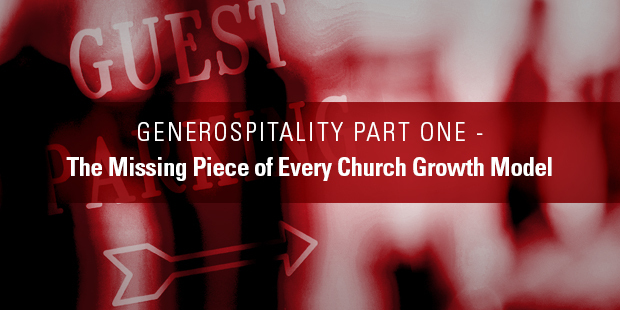
Generospitality Part One – The Missing Piece of Every Church Growth Model
Now all the believers were together and held all things in common. They sold their possessions and property and distributed the proceeds to all, as any had need. Every day they devoted themselves to meeting together in the temple, and broke bread from house to house. They ate their food with joyful and sincere hearts, praising God and enjoying the favor of all the people. Every day the Lord added to their number those who were being saved. -Acts 2:44-48 CSB
In my early days of ministry and seminary, these verses from Acts were the Holy Grail of church leadership. Rick Warren had just inspired us to live and lead Purpose Driven, and the vibrant picture of an effective and evangelizing church harkened back to the Early Church. We all wanted to be the church to which the Lord was adding to every day, and we all worked hard to restore parts of that Eden-like utopia of the Acts 2 Church. Well, all but the persecution parts, nobody was pursuing getting beaten or stoned.
In those days, we worked hard to be Purpose Driven and organized every ministry and job title in one of five ways to become effectively attractive. Then we wrote songs, dramatic sketches and leveraged the arts, like Willow, to become sensitive to those seeking Jesus. Or we created a culture of leadership like Andy and built churches for people who gave up on the church but not on God. And some of our churches grew, and then hosted conferences of their own. But most of our churches did not experience that hoped-for exponential growth of Acts 2.
Soon enough, a new generation emerged and brought a natural course correction in ministry practice, buoyed by their conviction that church was not singularly about the weekend after all. This new generation raised the intellectual bar on church growth and filtered everything through a Missional Church lens. Community in, and outside of, the church became the new Acts 2 standard. We needed to meet together, eat together and serve together… to do life together. We began to resist the large gatherings inside the church walls, and instead, shifted resources and energy to breaking bread daily and letting that be our witness to the world. We would even use words if necessary. Today, this missional renaissance has now survived its adolescence to emerge as a mature, and surprisingly reformed, disciple-making young adult.
All of these ideas and practices of church leadership over the last two decades are right in many ways. Purpose, creativity, community, and development are all evident in these verses from Acts 2. God has used each of our movements through the years to accomplish His will. However, it remains clear, today more than ever, that many of us still miss the beautiful simplicity of what was happening in those early days of Christianity. There was a different kind of movement underneath all Luke captured. Beyond gathering, eating, singing and serving, the Acts 2 Church pursued one practice above all others.

Tags: Bryan Rose, Generospitality













